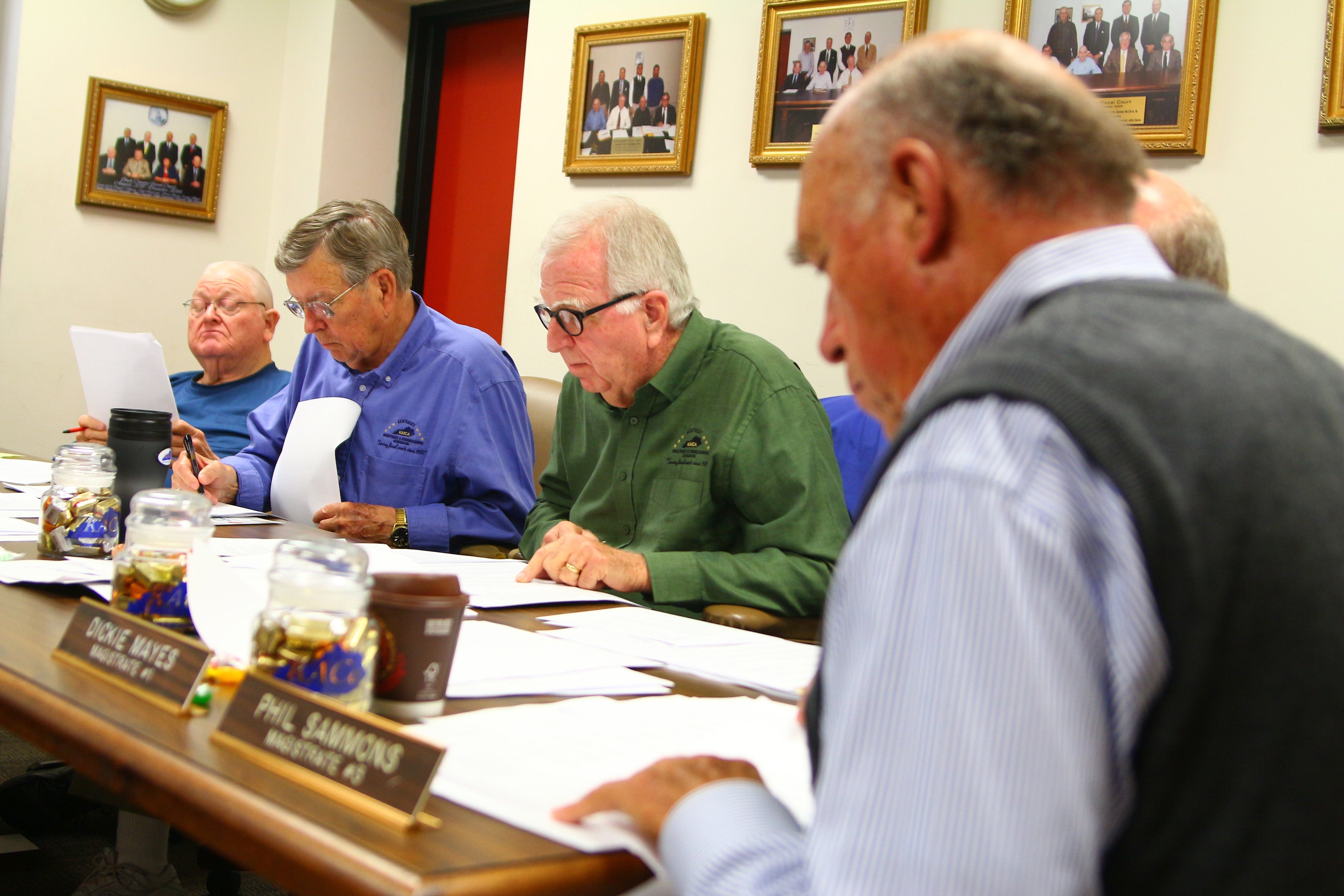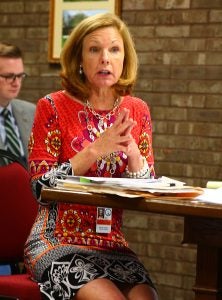Uncertainties loom over joint jail budget
Published 9:34 am Friday, April 28, 2017

- Ben Kleppinger/ben.kleppinger@amnews.com Boyle County magistrates review draft budget documents as they discuss the joint jail budget Tuesday.
The joint Boyle-Mercer jail budget is proposed at about $4.88 million for the next fiscal year, up just over $200,000 from the projected $4.67 million it’s expected to take to operate this fiscal year. But there are a lot of different questions out there for the coming year that could substantially change what that budget looks like.
Boyle County Treasurer Mary Conley and Judge-Executive Harold McKinney walked members of the fiscal court through all the uncertainties this week as the county began its annual series of budget workshops.
A lot of unknowns are due to the potential for state-level changes, which Boyle County has no control over, McKinney said. The biggest question mark may be the possibility of tax reform if the general assembly meets for a special called session this fall.
“We are kind of dealing with some unknown figures here. I feel it will come up a dozen times in our budget hearings that we don’t know what’s going to happen with this proposed called session,” he said. “… So we’re going to kind of go conservatively here, guys.”
Boyle County Jailer Barry Harmon said there’s also the potential for the state to change how many state inmates it locates at the Boyle jail. The state pays the county a per-inmate, per-day fee for housing state inmates, which provides a “substantial amount of revenue (that is) offsetting our expenses,” Conley said.
Harmon said “we never know what the DOC (state Department of Corrections) is going to do.”
“They will do something — I guarantee you — this coming year, this budget year. What? I don’t know,” he said. “In talking with (DOC) Commissioner (Rodney) Ballard, they’re looking to change that population a lot. By ‘a lot,’ I don’t know how ‘a lot.’”
Magistrate Jack Hendricks said he think Ballard is more concerned with state inmate populations than local jails, “so we could end up with more inmates, he ends up with less, and it makes the state look good.”
While state prisoners provide revenue for the local jail, they could also exacerbate the jail’s overcrowding problem in big enough numbers.
Harmon and McKinney disagreed with Hendricks perspective, saying they believe Ballard doesn’t want to harm local jails.
“Rodney Ballard and I disagree on some issues, but I do think he does have concern — he understands what it’s like to run a county jail,” McKinney said. “While we may have different philosophies … I think he understands we have a tough road to hoe here.”
“I agree with that totally; I think he is trying,” Hendricks said. “But the bottom line is that he’s more concerned about keeping the state prisoners in the state prisons … at a level, low number. And if that means sending prisoners our way, it’s pretty obvious they’ll do it. They’ve done it in the past.”

Ben Kleppinger/ben.kleppinger@amnews.com
Boyle County Treasurer Mary Conley walks members of the Boyle County Fiscal Court through the proposed joint jail budget Tuesday.
Conley highlighted another potential state-level issue that could impact funding for the jail: Currently, Boyle and Mercer counties both get “very minimal” funding from the state to help run the jails — Boyle County gets about $94,000 and Mercer County gets about $64,000.
“We’ve been through where they’ve done cash-neutral legislation and what happens is … a lot of times that affects the counties,” she said. “When the states have their budgets cut, a lot of times they go for those monies, so they cut the amount of money that they send to the counties.”
Conley said that funding has been reduced by the state one time in the past.
“We just need to be aware that this budget that we’re passing — there may be some areas that may see cuts when it comes to the state,” she said. “… So just keep that in the back of your mind.”
Yet another source of state funding for the jail should also be watched — “local corrections assistance moneys,” Conley said.
Those funds have been coming to counties annually since the state passed a bill two legislative sessions ago that “did some reorganizing,” Conley said.
“With the savings they created, they funneled those savings back to the counties,” she explained.
Boyle is slated to receive $65,000 and Mercer $25,000 from that funding, Conley said, adding that she did some research to see if that funding could be going away soon.
“All the people that I have spoken with who are in this department do not foresee that this money is going to dry up soon,” she said. “But again, we haven’t gone through a September session, so we don’t know what’s going to happen.”
Conley said the local corrections assistance funds have not been used for the jail’s annual budget; the county has instead socked those funds away in a savings account.
On top of all that, the counties still have to determine what will be done about a pair of local issues: bidding a new health care contract for the jail and the possibility of building an entirely new jail facility.
Officials are in the process of requesting bids for the health care contract, which they say could easily exceed current costs by $100,000; and they are working to find consultants who could draw up plans for a new jail facility, which would be a multi-million-dollar undertaking.
“We have not finished up with the consulting side of what we need to do in the future,” Conley said. “So the budget that you have presented before you does not deal with any debt service; it does not deal with any future plans.”
“The fiscal court is going to have to — whenever we do make these decisions — amend this budget mid-year,” she said. “I just want to put that out on the table right away so nobody is surprised when we get to that point.”
McKinney said once Boyle County has more information from consultants, Boyle officials should sit down with Mercer officials to discuss “long-term decisions” about the jail.
“They need to be at the table and we need to be at the table,” he said. “… We’re going to have to make some tough decisions on where we think we want to be. So we need to see where they (want to be). And I think that’s got to be done together. I just think that’s a real important point to make today — that we don’t want to make decisions independently. … They need to decide where they want to be and we need to decide where we want to be. And if that’s the same place, then we’ve got to figure out the cost.”





